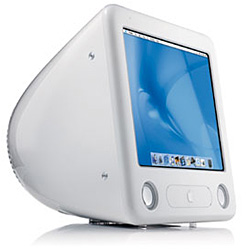In a recent article, Carl Nygren talked about upgrading his eMac for better
performance, including gaming and watching HD (high-definition)
movies.
First, let me say I agree with his assessment of the eMac as an excellent and still-viable
platform for, well, almost everything a person would want to use a
computer for - word processing, web surfing, email, instant messaging,
listening to music and watching movies, and running the iLife suite of
applications. Given that the later models can run Leopard - and very
well - says a lot about their staying power - and their viability even
in the office. I say this as a man who once used an eMac much like
Carl's as his only Mac, even going so far as to put Garage Band and
iMovie through their paces.

However, there's something that Carl doesn't talk about in his
article that I think needs some consideration - one should not open an
eMac lightly. This isn't some generic, built-to-be-opened beige box PC
we're talking about, but a finely tuned and tightly engineered
all-in-one system, and there are some rules that must be followed. It's
not the walk in the park that Carl makes it sound like when he refers
to replacing the hard drive or installing that SuperDrive that he
scored in his Dumpster Dell. He denigrates his own abilities as a
technician when he glosses over the steps he took to ensure a
successful upgrade.
That being as it may, there's no reason to run in terror from an
eMac, even one as in need of an upgrade as the one that Carl started
with.
The memory is the easiest upgrade. A single Phillips head screw is
all that separates you from the memory compartment on the underside of
the eMac. It's about as easy an upgrade as you get on an all-in-one
computer system, and I highly advise it. Earlier eMacs used PC100 and
PC133 RAM, which you can get for a song nowadays, and even these higher
end units are thrilled with fairly common and similarly cheap PC2700
DIMMs. An upgrade from 256 MB of RAM to 1024 MB or more is cheap, easy,
and will make you think you somehow managed to upgrade the processor
along with the memory, because your system will react so quickly.
Where we go our separate ways is in upgrading the hard drive and
optical drive. Again, when I began to use my eMac, it was my only Mac,
and as such, I was loath to take the shroud off and tinker, lest I
break something irrevocably.
But you have to consider: the eMac is nothing more than an iMac G4
made cheaper for the education market by the use of a CRT instead of an
LCD. Like every iMac ever made, it is designed to be upgraded from the
outside by judicious use of FireWire and USB.
My eMac has a 40 GB internal drive, just like Carl's. It's not fast
(5400 rpm, if I recall correctly) and tends to fill up quickly if you
start adding digital media. Because of that, I pulled a 300 GB drive
from an old PC server I was no longer using, stuffed it into a powered
USB hard drive case, and plugged it in. With a little Disk Utility
tinkering, I had increased my storage space by 750% and never once had
to crack the case.
On a similar bent, when I decided that I needed the ability to do
more than just read DVDs with the built-in Combo drive, I hooked up a
Sony FireWire DVD±RW drive. Again, the system recognized it
immediately, and I had the ability to burn DVDs at need. The nicest
part about this arrangement is that I can unplug and put the drive away
when it isn't needed, which is, honestly, most of the time.
Hmm - I think I begin to understand the allure of the MacBook Air and it's external
optical drive now.
We have similarly upgraded systems, Carl and I - his with a bit more
memory, mine with a bit more hard drive space. Our eMacs are running
the same OS and enjoying the same performance increases and increased
lifespan because of it. And while replacing the internal components
does leave additional ports available for future growth, and a faster
internal drive does allow for better response from the operating
system, adding capacity with external devices gives me similar results
without the technical headaches.
And they say that Apples are hard to upgrade. Here are two different
ways, both of which worked fantastically and made a five-year-old
computer run a nine-month-old operating system and still support
software that was released yesterday.

Editor's note: I have the same eMac as Carl and Jason. After
replacing the internal hard drive once, I swore it off. My preference
is for an external 7200 rpm FireWire drive, which isn't only fast, but
also easy to move from one Mac to another. Also note that only the last
two generations of eMacs support USB 2.0, making FireWire a far better
choice on the first and second generation models. dk



